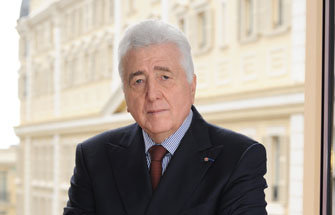
2021 will be remembered for the turbulence caused by COVID-19 and the increased efforts to safeguard Monaco’s economy. How did the banking sector respond? We hear from Etienne FRANZI, President of the Monaco Association for Financial Activities.
How would you review 2021?
2021 was a good year, despite the periodic resurgences of COVID-19. Assets exceeded 150 billion euros – 153.1 billion to be exact – and the breakdown is interesting: 99.4 billion in securities and 53.7 billion in deposits. The 15% increase over the year was not solely driven by market developments; we took in nearly 7 billion in new assets. Loans have also done well, totalling 29.9 billion euros, or an 11% increase compared with December 2020.
And what about financial institutions?
We were delighted to welcome some new management companies. Seven were accredited in 2021, including Goldman Sachs, a prestigious brand, as well as Pictet, who joined us last year. The Financial Activities Supervisory Commission (CCAF) is currently reviewing new applications from financial institutions hoping to establish themselves in Monaco.
In conclusion, we have seen good results in terms of both figures and financial institutions.
What projects are currently underway?
The draft legislation on Various Economic and Legal Provisions (DDOEJ) is a text which I would describe as “impressionistic” in the sense that, without disrupting anything, it should improve how we function in several areas. It makes alterations to the right of pledge, deeds of security, loans, aspects of limited liability companies (SARLs), and more, taking an essentially technical approach to updating our legal framework. The text was submitted to the National Council in November 2021. We hope that it will be passed during the current spring session.
In July last year, the Monaco Association for Financial Activities (AMAF) signed a protocol with SICCFIN (Service d’information et de Contrôle sur les Circuits Financiers), updating the procedures for on-site audits as the previous version dated back to June 2012. These audits are a key part of anti-money laundering efforts, which help to ensure that each institution has the most effective tools to fight the ongoing battle between the money launderers’ arrow and the institutions’ shield.
As part of the “Monaco? A Safe City” project, we have also signed a cooperation agreement that strengthens the partnership between the banks and the Police Department with the creation of the Vigibanque Committee.
Are there new certifications on the agenda?
We introduced professional certification for front office staff.
This was followed by confidentiality certification, which emphasises the attention that should be paid to clients’ privacy. This covers everyone working in the industry, with all staff required to undergo certification once every three years through a programme which is updated each time.
Today, the new certification on compliance with anti-money laundering and countering the financing of terrorism (AML/CFT) measures demonstrates the industry’s full commitment, alongside the Monegasque authorities, to this area, which is critical to the Principality’s reputation and attractiveness. The teams responsible for these issues within our firms will need to obtain this certification, which will be launched after the summer.
Is there good awareness of Environmental, Social, and Governance (ESG) issues within the industry?
Absolutely. We have asked our members to appoint an ESG manager within each of their institutions, and we are going to create an association that brings them together. It’s not dissimilar to what was done, at the time, with the Monegasque Association of Compliance Officers (AMCO), which was evidently successful. Our idea is to create a think tank that will contribute to our thinking and explore all possible avenues for development.
Has the conflict between Russia and Ukraine had an impact on financial institutions?
The compliance and loan departments have been in high demand. It is worth noting that there has been full cooperation with the Ministry of Finance and Economy and the Department of Budget and Treasury: we were informed within the hour of new elements related to the development of the conflict. The industry has been exemplary in freezing assets and implementing the restrictions that apply to Russian clients resident outside Monaco, the European Union, Switzerland and other countries within the European Economic Area.
From a financial perspective, the impact so far would appear to be relatively limited.





